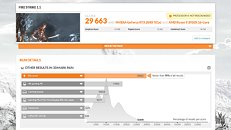- Joined
- Oct 9, 2007
- Messages
- 47,182 (7.56/day)
- Location
- Hyderabad, India
| System Name | RBMK-1000 |
|---|---|
| Processor | AMD Ryzen 7 5700G |
| Motherboard | ASUS ROG Strix B450-E Gaming |
| Cooling | DeepCool Gammax L240 V2 |
| Memory | 2x 8GB G.Skill Sniper X |
| Video Card(s) | Palit GeForce RTX 2080 SUPER GameRock |
| Storage | Western Digital Black NVMe 512GB |
| Display(s) | BenQ 1440p 60 Hz 27-inch |
| Case | Corsair Carbide 100R |
| Audio Device(s) | ASUS SupremeFX S1220A |
| Power Supply | Cooler Master MWE Gold 650W |
| Mouse | ASUS ROG Strix Impact |
| Keyboard | Gamdias Hermes E2 |
| Software | Windows 11 Pro |
AMD's upcoming Ryzen 9 3950X socket AM4 processor beats Intel's flagship 18-core processor, the Core i9-10980XE, by a staggering 24 percent at 3DMark Physics, according to a PC Perspective report citing TUM_APISAK. The 3950X is a 16-core/32-thread processor that's drop-in compatible with any motherboard that can run the Ryzen 9 3900X. The i9-10980XE is an 18-core/36-thread HEDT chip that enjoys double the memory bus width as the AMD chip, and is based on Intel's "Cascade Lake-X" silicon. The AMD processor isn't at a tangible clock-speed advantage. The 3950X has a maximum boost frequency of 4.70 GHz, while the i9-10980XE isn't much behind, at 4.60 GHz, but things differ with all-core boost.
When paired with 16 GB of dual-channel DDR4-3200 memory, the Ryzen 9 3950X powered machine scores 32,082 points in the CPU-intensive physics tests of 3DMark. In comparison, the i9-10980XE, paired with 32 GB of quad-channel DDR4-2667 memory, scores just 25,838 points as mentioned by PC Perspective. Graphics card is irrelevant to this test. It's pertinent to note here that the 3DMark physics test scales across practically any number of CPU cores/threads, and the AMD processor could be benefiting from a higher all-core boost frequency than the Intel chip. Although AMD doesn't mention a number in its specifications, the 3950X is expected to have an all-core boost frequency that's north of 4.00 GHz, as its 12-core sibling, the 3900X, already offers 4.20 GHz all-core. In contrast, the i9-10980XE has an all-core boost frequency of 3.80 GHz. This difference in boost frequency, apparently, even negates the additional 2 cores and 4 threads that the Intel chip enjoys, in what is yet another example of AMD having caught up with Intel in the IPC game.

View at TechPowerUp Main Site
When paired with 16 GB of dual-channel DDR4-3200 memory, the Ryzen 9 3950X powered machine scores 32,082 points in the CPU-intensive physics tests of 3DMark. In comparison, the i9-10980XE, paired with 32 GB of quad-channel DDR4-2667 memory, scores just 25,838 points as mentioned by PC Perspective. Graphics card is irrelevant to this test. It's pertinent to note here that the 3DMark physics test scales across practically any number of CPU cores/threads, and the AMD processor could be benefiting from a higher all-core boost frequency than the Intel chip. Although AMD doesn't mention a number in its specifications, the 3950X is expected to have an all-core boost frequency that's north of 4.00 GHz, as its 12-core sibling, the 3900X, already offers 4.20 GHz all-core. In contrast, the i9-10980XE has an all-core boost frequency of 3.80 GHz. This difference in boost frequency, apparently, even negates the additional 2 cores and 4 threads that the Intel chip enjoys, in what is yet another example of AMD having caught up with Intel in the IPC game.

View at TechPowerUp Main Site



 Waiting for real review oc tests. The R9 3900x also boasted a lot. and then shove very disappointing in the OC field .
Waiting for real review oc tests. The R9 3900x also boasted a lot. and then shove very disappointing in the OC field .
 ).
). .
.